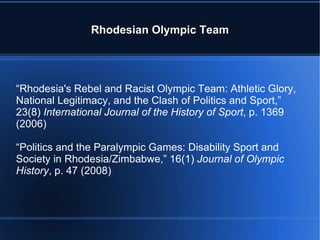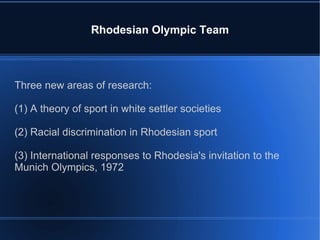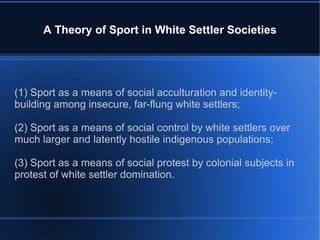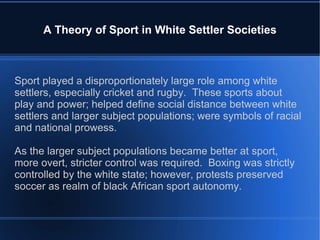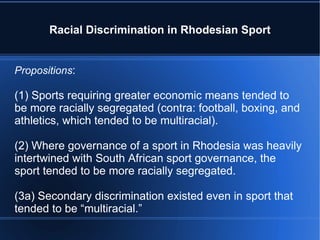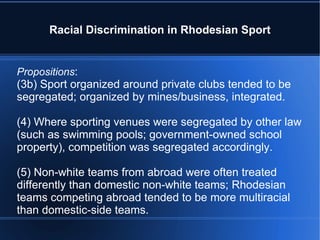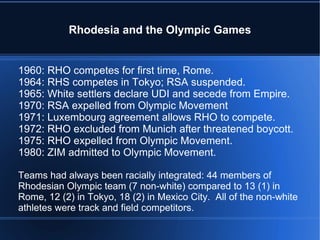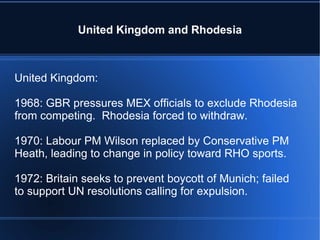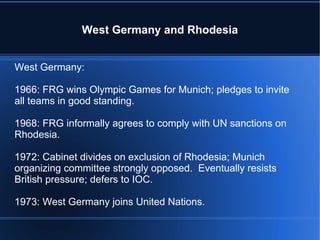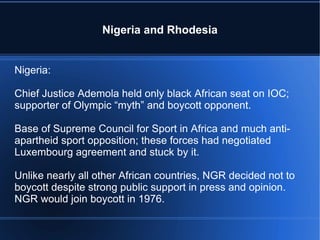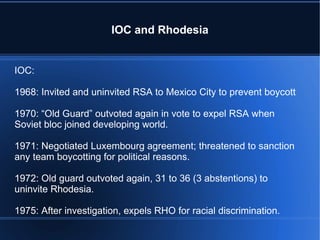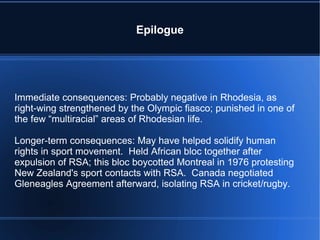Rhodesia Olympic Games 1972
- 1. New and Continuing Research on the Rhodesian Olympic Team Andrew Novak, Esq. U.S. Dept. of Labor
- 2. Rhodesian Olympic Team â Rhodesia's Rebel and Racist Olympic Team: Athletic Glory, National Legitimacy, and the Clash of Politics and Sport,â 23(8) International Journal of the History of Sport , p. 1369 (2006) â Politics and the Paralympic Games: Disability Sport and Society in Rhodesia/Zimbabwe,â 16(1) Journal of Olympic History , p. 47 (2008)
- 3. Rhodesian Olympic Team Three new areas of research: (1) A theory of sport in white settler societies (2) Racial discrimination in Rhodesian sport (3) International responses to Rhodesia's invitation to the Munich Olympics, 1972
- 4. A Theory of Sport in White Settler Societies (1) Sport as a means of social acculturation and identity-building among insecure, far-flung white settlers; (2) Sport as a means of social control by white settlers over much larger and latently hostile indigenous populations; (3) Sport as a means of social protest by colonial subjects in protest of white settler domination.
- 5. A Theory of Sport in White Settler Societies Sport played a disproportionately large role among white settlers, especially cricket and rugby. These sports about play and power; helped define social distance between white settlers and larger subject populations; were symbols of racial and national prowess. As the larger subject populations became better at sport, more overt, stricter control was required. Boxing was strictly controlled by the white state; however, protests preserved soccer as realm of black African sport autonomy.
- 6. Racial Discrimination in Rhodesian Sport Propositions : (1) Sports requiring greater economic means tended to be more racially segregated (contra: football, boxing, and athletics, which tended to be multiracial). (2) Where governance of a sport in Rhodesia was heavily intertwined with South African sport governance, the sport tended to be more racially segregated. (3a) Secondary discrimination existed even in sport that tended to be âmultiracial.â
- 7. Racial Discrimination in Rhodesian Sport Propositions : (3b) Sport organized around private clubs tended to be segregated; organized by mines/business, integrated. (4) Where sporting venues were segregated by other law (such as swimming pools; government-owned school property), competition was segregated accordingly. (5) Non-white teams from abroad were often treated differently than domestic non-white teams; Rhodesian teams competing abroad tended to be more multiracial than domestic-side teams.
- 8. Rhodesia and the Olympic Games 1960: RHO competes for first time, Rome. 1964: RHS competes in Tokyo; RSA suspended. 1965: White settlers declare UDI and secede from Empire. 1970: RSA expelled from Olympic Movement 1971: Luxembourg agreement allows RHO to compete. 1972: RHO excluded from Munich after threatened boycott. 1975: RHO expelled from Olympic Movement. 1980: ZIM admitted to Olympic Movement. Teams had always been racially integrated: 44 members of Rhodesian Olympic team (7 non-white) compared to 13 (1) in Rome, 12 (2) in Tokyo, 18 (2) in Mexico City. All of the non-white athletes were track and field competitors.
- 9. United Kingdom and Rhodesia United Kingdom: 1968: GBR pressures MEX officials to exclude Rhodesia from competing. Rhodesia forced to withdraw. 1970: Labour PM Wilson replaced by Conservative PM Heath, leading to change in policy toward RHO sports. 1972: Britain seeks to prevent boycott of Munich; failed to support UN resolutions calling for expulsion.
- 10. West Germany and Rhodesia West Germany: 1966: FRG wins Olympic Games for Munich; pledges to invite all teams in good standing. 1968: FRG informally agrees to comply with UN sanctions on Rhodesia. 1972: Cabinet divides on exclusion of Rhodesia; Munich organizing committee strongly opposed. Eventually resists British pressure; defers to IOC. 1973: West Germany joins United Nations.
- 11. Nigeria and Rhodesia Nigeria: Chief Justice Ademola held only black African seat on IOC; supporter of Olympic âmythâ and boycott opponent. Base of Supreme Council for Sport in Africa and much anti-apartheid sport opposition; these forces had negotiated Luxembourg agreement and stuck by it. Unlike nearly all other African countries, NGR decided not to boycott despite strong public support in press and opinion. NGR would join boycott in 1976.
- 12. IOC and Rhodesia IOC: 1968: Invited and uninvited RSA to Mexico City to prevent boycott 1970: âOld Guardâ outvoted again in vote to expel RSA when Soviet bloc joined developing world. 1971: Negotiated Luxembourg agreement; threatened to sanction any team boycotting for political reasons. 1972: Old guard outvoted again, 31 to 36 (3 abstentions) to uninvite Rhodesia. 1975: After investigation, expels RHO for racial discrimination.
- 13. Epilogue Immediate consequences: Probably negative in Rhodesia, as right-wing strengthened by the Olympic fiasco; punished in one of the few âmultiracialâ areas of Rhodesian life. Longer-term consequences: May have helped solidify human rights in sport movement. Held African bloc together after expulsion of RSA; this bloc boycotted Montreal in 1976 protesting New Zealand's sport contacts with RSA. Canada negotiated Gleneagles Agreement afterward, isolating RSA in cricket/rugby.


